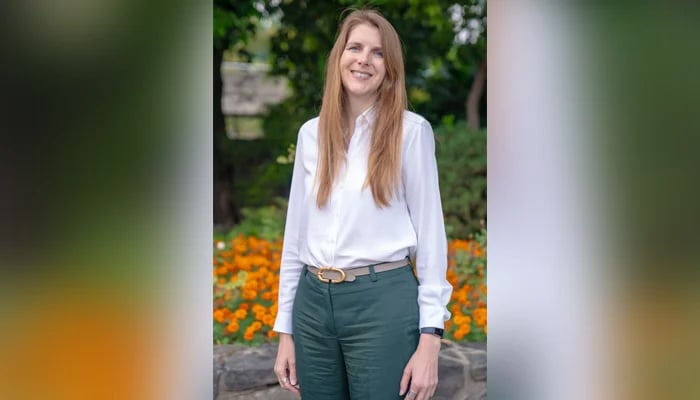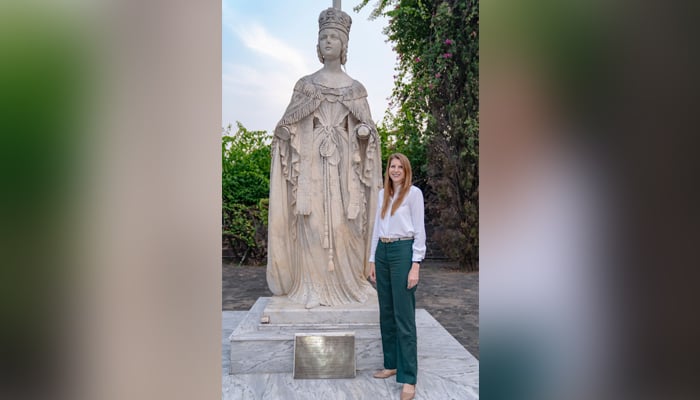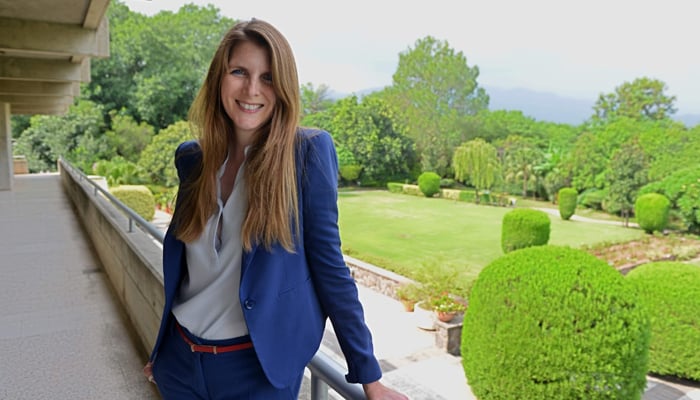Though British High Commissioner to Pakistan, Jane Marriott, is regularly featured in mainstream and social media for her diplomatic duties, most Pakistanis know little about her early years, career journey, challenges as a woman diplomat, insights on Pakistan, and views on art, culture, and gender equality. So let’s dive into her accomplished life.
Q: You were born in Doncaster, a Yorkshire town, so what was life like for you there?
Marriott: Doncaster is an old coal mining town, and both my grandfathers were coal miners. It’s an industrial town, but a lovely place with very friendly people, especially the Yorkshire folk. One thing I didn’t realise until I moved to London was just how instinctively Yorkshire people will talk to anyone. If you’re waiting for a bus and there’s someone nearby, within two seconds, you’ll be deep in conversation with them, discovering mutual acquaintances. It’s just the Yorkshire way, and it was part of what made my childhood so special. Growing up there wasn’t much about money. My parents both left school at 15 and 16 without qualifications, but my dad put himself through night school to become an accountant and eventually moved into middle management. I didn’t realise until later how fortunate I was to grow up in a loving home, with two parents and a big sister who unconditionally supported me. That’s not something everyone has, and I now recognise how rare it is. I attended an infant school, a middle school, and then a larger school for ages 13 to 18 in Doncaster. It was a very happy childhood.
You must be a fighter, to go from Doncaster to Cambridge and then end up in the Foreign Service of one of the major countries in the world. That’s quite an achievement!
I didn’t really have any concept of those things being possible. When I was at school, my sister was the first in our extended family to go to university, and I was the first to do a master’s. It was a new generation, with new opportunities that our parents didn’t have. I applied to Oxford because I thought, “Why not? I’m smart enough.” I passed all the exams, but when I went for the interview, I had no idea what to expect. Oxford had four men lounging around, firing questions at me, and I completely messed it up. But I still got into Durham University. Later, I decided to go to Cambridge for my master’s.
Did you always want to be a diplomat?
Not at all. When I was 13, I saw the BBC journalist, Kate Adie, covering the 1989 protests at Beijing’s Tiananmen Square. She was crouched under fire, covering such a huge global event. It was a real turning point for me because I didn’t know women could be war correspondents. That looked fascinating, so I decided I wanted to pursue journalism. From the age of 13 to 20, I worked part-time at The Times and The Observer, but my mum suggested I apply for the civil service. At the time, I thought it would just involve working in a local benefits office, but eventually, I worked in the Cabinet Office and then discovered the Foreign Office. I realised I had a degree in international relations, and that was when I decided to work there. It was a convoluted journey, but it all came together.

You’ve worked in some very tricky places like Yemen, Kenya, Iraq, Afghanistan, and Pakistan. Did you ever feel like being a woman in such situations was an obstacle?
I definitely felt like I was stepping into a man’s world. My first posting was in Iraq, where I was one of five women among 1,200 British military men. I was the only civilian in that group, and it was an intense experience, particularly when I was thrown into negotiations with Iraqis and the Marsh Arabs. At first, I felt like I was this strange third gender. I was obviously female, but I wasn’t “female” in the way they were used to seeing women. It gave me some leeway to fit into a different space. In some ways, it worked to my advantage because people were curious to meet me—after all, they didn’t often meet women in such environments. I also found that people sometimes underestimated me, assuming I wasn’t very smart. But as a diplomat, you’re trained to build trust and keep people’s confidence. I quickly realised that I could develop strong relationships and networks, which worked out well in the long run.
Do you think being a woman has hindered your career in diplomacy?
I’ve never been a man, so I can’t compare, but I think there are both advantages and disadvantages. I’ve walked into rooms where men immediately reduced my perceived intelligence simply because I’m a woman. I’ve experienced times when men didn’t listen to my ideas because they were distracted by my gender. But rather than focus on those challenges, I have always tried to ignore them and reinforce my point. If necessary, I’ve walked out of rooms when situations became unacceptable.

How do you see relations between Britain and Pakistan?
The UK and Pakistan share a relationship that feels like an old marriage. We know each other’s flaws, and we know how to press each other’s buttons. But there’s also a deep affection, respect, and love between our countries. It’s something that’s not always rational but is very strong and rooted in history. As the British high commissioner, one of my key roles is to nurture this relationship, which is incredibly important in today’s fragmented world. It’s vital that we maintain a strong and dependable connection, especially in a time of global uncertainty. While there are certainly differences, especially regarding democracy and media freedoms, we work closely to build trust and have frank, private conversations. We want to maintain strong ties with all political parties, and this approach is critical in a democracy.
What about art and culture? Do you think they can bring our countries closer?
Art and culture have played a significant role in strengthening the relationship between the UK and Pakistan. British culture has had an impact, and there’s a deep interest in the connections between British Pakistanis and the UK. Many Pakistanis who’ve settled in the UK contribute to the cultural exchange, especially in places like Doncaster, where I grew up, and where there’s a rich history of Pakistani communities involved in the cotton and gold sectors. I’ve noticed here that British TV shows, like Doctor Who and Sherlock Holmes, are extremely popular, alongside classic comedies such as Mind Your Language, Mr Bean, Yes Minister, and Yes Prime Minister. It’s fascinating how British culture, especially TV, has resonated here. On the music side, British artists like Coldplay, Led Zeppelin, One Direction, Dua Lipa, Ed Sheeran, and Adele also have a massive following in Pakistan. We’re organising an event in Karachi to celebrate both British and Pakistani music. There’s going to be a surprise element, with the military band from the UK performing a rendition of the Pakistani Punjabi song, Pasuri, and we’ll bring more artists from both countries together. Additionally, I’m really focused on promoting Pakistan in the UK as a beautiful, historic country with much to offer, beyond the common stereotypes. I want to help showcase Pakistan’s rich history, culture, and hospitality with the UK and Pakistan cultural exchanges. There’s so much more to Pakistan than meets the eye.
Who is your favourite Pakistani artist?
That’s a tough choice, as Pakistan has so many talented artists! I’ve always been drawn to Nusrat Fateh Ali Khan — his qawwalis have a timeless quality that resonates across cultures. His music is powerful and deeply emotional, and it’s amazing to see how his legacy lives on globally. I also admire Ali Sethi, Faris Shafi, and Gharwi Group for their versatility and ability to connect with audiences in so many genres. Pakistan’s music scene is incredibly vibrant, from folk and classical to contemporary pop, and it’s wonderful to see artists who bring such rich diversity to the stage.

Are the British Pakistanis contributing to being ‘Brilliantly British’?
Absolutely, 1.6 million Brits of Pakistani origin have done phenomenally well in the UK, particularly in politics, business, and fashion. From Scotland’s former First Minister to the Mayor of London, these figures show how integrated Pakistanis are in British society. People like Zayn Malik, though he might not be as big in Pakistan as I expected, are key figures. Similarly, actors like Jameela Jamil and Riz Ahmed are fantastic ambassadors of British-Pakistani culture. Beyond entertainment, the diaspora shapes Britain’s landscape in business, academia, and public service. Every field they touch reflects the spirit of diversity, creativity, and shared heritage, showing that being Brilliantly British is all about celebrating the stories and talents that connect us.
We often see Pakistanis on the streets of London, especially when Pakistani politicians or other key figures, like the recently retired chief justice, attend events. Do you believe their actions are creating tensions between Pakistan and Britain, especially with the way these crowds are allowed to take over the streets and gather outside the leaders’ residences?
As long as people follow the rule of law, it’s fine for people to express their opinions. However, when it comes to protests outside residences, I think there is a line that should not be crossed. Some protests might create unnecessary tension, but generally, peaceful protests are part of the democratic process. The key is that the protests should be lawful and respectful of public spaces.
Many Pakistanis want to study in the UK but struggle to get student visas. Isn’t it a pretty tall order, now?
It’s true that getting into the UK for education has become more challenging, both financially and visa-wise. However, the number of Pakistani students going to the UK remains impressive—over 43,000 student visas were issued last year alone, and the figure is expected to increase this year. While tuition fees have risen, the UK’s education system is still highly valued. Another option is transnational education, where students can earn UK qualifications while staying in Pakistan. There’s a real push to make quality education more accessible.
What is your frank opinion about opportunities available to Pakistani women to grow and achieve equality as citizens?
There is a lot of concern about the lack of gender equality in Pakistan. The latest Global Gender Gap Index by the World Economic Forum has placed it near the bottom of the list. I think the country will become much stronger economically if it harnesses the full potential of women. It’s not just about moral equality—it makes economic sense to allow women the same opportunities as men. Whether that’s in business, the workforce, or at home, women deserve equal opportunities to thrive. Pakistan will be stronger for it.
Now, with the British King’s birthday coming up, what are your thoughts on the transition from Queen Elizabeth II to King Charles III?
It was a big adjustment, especially when it came to singing “God Save the King” instead of “God Save the Queen.” I remember the first time I had to do it in Kenya after Her Majesty passed away. I accidentally said, “God Save Our Gracious Queen,” and then quickly corrected myself, which was a bit embarrassing. The Queen was such a steady figure, providing a sense of certainty for so many. Now, with King Charles, we’ve adapted quickly. He’s visited Pakistan before, and there’s a deep respect for him. It’s His Majesty King Charles III’s 76th birthday on November 14th! This year, we’ll be celebrating the King’s birthday in Islamabad and Karachi with a theme of “Brilliantly British,” which will showcase the best of British music, arts, food, and cricket.
We are thrilled to have the Honourable Artillery Company Regimental Band touring Pakistan this year. They made a splash last year with their rendition of Pasoori, which went viral. And look out for another surprise this year! We also have multiple Pakistani acts performing at our KBP events. Everyone knows Glastonbury, but for the first time, we’ll welcome you to ‘Actonbury’ in Karachi, paying tribute to the vibrant music scene in both countries.
In Islamabad, we are celebrating all things Brilliantly British. And what’s ‘Brilliantly British often overlaps with what’s ‘Perfectly Pakistani’- sports (though I don’t want to think too much about the cricket that’s just happened), arts, food (the Balti, invented by a British Pakistani, is now a staple of UK cuisine). Events like these highlight the energy and creativity shared by the UK and Pakistan, bringing us closer through our love for music and art.


